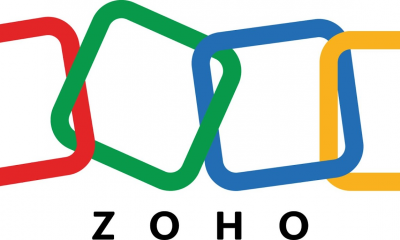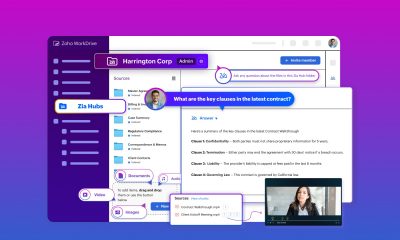Technology
How Businesses Can Navigate Inflation by Adopting Cloud Technology

By Kehinde Ogundare
In recent years, the global economy has faced and continues to face numerous challenges, including a pandemic, war, climate change, and inflation. Businesses have had to adapt and find new ways of working to tackle these challenges. Nigeria is no exception.
According to the National Bureau of Statistics of Nigeria, the annual inflation rate accelerated to 24.08% in July 2023, the highest since September 2005. This has affected everything from electricity tariffs to transportation, all crucial to the performance of Nigerian enterprises.
Fortunately, by adopting the right technologies and using them the right way, enterprises can ensure that they’re in the best possible position to tackle these challenges head-on. Technology does not only enable enterprises to cut costs, find efficiencies, and unlock higher productivity levels; it also allows them to engage with customers better and find new avenues for growth.
Hybrid work model backed by robust collaboration tools as a means to cut costs
Embracing remote and hybrid work models can exponentially decrease the costs associated with maintaining an office space. Think reduction in the costs of diesel or fuel, WiFi, office leases, facility management, and so on. Collaboration and communication tools have also substantially evolved to support distributed workforces, helping enterprise teams stay connected from afar and sustain efficiency and productivity. Video conferencing, project management, and various collaboration tools help ensure that team members can work together regardless of their physical location.
Remote and hybrid work can also make it easier to expand into new regions. There are, for example, companies in Nigeria that now work with team members in Kenya, South Africa, and other parts of the world with ease.
Embracing cloud-based storage
Another factor to consider is the ability to work and save more information to the cloud, eliminating the need for excess paperwork and large machinery that often leads to extensive hardware maintenance. Moving paperwork like payroll processing, salary disbursement, customer records, and support inquiries to the cloud opens up further potential to analyse available data and automate repetitive tasks where necessary. This can significantly reduce the manual labour of data entry for staff, thereby making them more efficient and productive. The cost benefits that emerge from cloud-based storage and software are numerous, ranging from reduction in material (like paper) costs, cost savings from clearing up office space, and cost optimisation by proper resource utilisation towards important tasks rather than monotonous labour.
Understanding what the customer wants
Most businesses also deal with retail and distribution in one form or another. As such, there is a need for businesses to maximise their online presence to reach out to target audiences and have access to a wider customer base while reducing the costs and labour associated with physical marketing. Data analytics and similar tech tools can help determine the level of attention that a campaign or product is getting and what type of audience demographic is engaging with it. Analytical tools will further help track relevant information and lead to better decision-making as well as allocation of resources.
From customer relationship management to energy efficiency, and improved cybersecurity to financial management, cloud technology has played a huge role in establishing a better work environment, and it is definitely the way to go in today’s business world. Cloud technology vendors have also adapted and modernised their offerings across multiple business areas to suit today’s landscape and help companies scale and improve efficiency. Zoho, for instance, has over 55 products as part of its cloud portfolio, which caters to an array of business needs from sales, marketing, and business intelligence to employee collaboration, HR, and finance.
To implement these technologies successfully, Nigerian enterprises should additionally consider conducting a thorough cost-benefit analysis, investing in training employees, and ensuring that their IT infrastructure is secure and well-maintained. These are equally crucial for achieving long-term competitiveness and cost optimisation through technology.
Kehinde Ogundare is the Country Manager for Zoho Nigeria
Technology
Leticia Otomewo Becomes Secure Electronic Technology’s Acting Secretary

By Aduragbemi Omiyale
One of the players in the Nigerian gaming industry, Secure Electronic Technology (SET) Plc, has appointed Ms Leticia Otomewo as its acting secretary.
This followed the expiration of the company’s service contract with the former occupier of the seat, Ms Irene Attoe, on January 31, 2026.
A statement to the Nigerian Exchange (NGX) Limited on Thursday said Ms Otomewo would remain the organisation’s scribe in an acting capacity, pending the ratification and appointment of a substantive company secretary at the next board meeting.
She was described in the notice signed by the Managing Director of the firm, Mr Oyeyemi Olusoji, as “a results-driven executive with 22 years of experience in driving business growth, leading high-performing teams, and delivering innovative solutions.”
The acting secretary is also said to be “a collaborative leader with a passion for mentoring and developing talent.”
“The company assures the investing public that all Company Secretariat responsibilities and regulatory obligations will continue to be discharged in full compliance with the Companies and Allied Matters Act, applicable regulations, and the Nigerian Exchange Limited Listing Rules,” the disclosure assured.
Meanwhile, the board thanked Ms Attoe “for professionalism and contributions to the Company during the period of her engagement and wishes her well in her future endeavours.”
Technology
Russia Blocks WhatsApp Messaging Service

By Adedapo Adesanya
The Russian government on Thursday confirmed it has blocked the WhatsApp messaging service, as it moves to further control information flow in the country.
It urged Russians to use a new state-backed platform called Max instead of the Meta-owned service.
WhatsApp issued a statement earlier saying Russia had attempted to “fully block” its messaging service in the country to force people toward Max, which it described as a “surveillance app.”
“Today the Russian government attempted to fully block WhatsApp in an effort to drive people to a state-owned surveillance app,” WhatsApp posted on social media platform X.
“Trying to isolate over 100 million users from private and secure communication is a backwards step and can only lead to less safety for people in Russia,” it said, adding: “We continue to do everything we can to keep users connected.”
Russia’s latest move against social media platforms and messaging services like WhatsApp, Signal and Telegram comes amid a wider attempt to drive users toward domestic and more easily controlled and monitored services, such as Max.
Russia’s telecoms watchdog, Roskomnadzor, has accused messaging apps Telegram and WhatsApp of failing to comply with Russian legislation requiring companies to store Russian users’ data inside the country, and of failing to introduce measures to stop their platforms from being used for allegedly criminal or terrorist purposes.
It has used this as a basis for slowing down or blocking their operations, with restrictions coming into force since last year.
For Telegram, it may be next, but so far the Russian government has been admittedly slowing down its operations “due to the fact that the company isn’t complying with the requirements of Russian legislation.”
The chat service, founded by Russian developers but headquartered in Dubai, has been a principal target for Roskomnadzor’s scrutiny and increasing restrictions, with users reporting sluggish performance on the app since January.
Technology
Nigerian AI Startup Decide Ranks Fourth Globally for Spreadsheet Accuracy

By Adedapo Adesanya
Nigerian startup, Decide, has emerged as the fourth most accurate Artificial Intelligence (AI) agent for spreadsheet tasks globally, according to results from SpreadsheetBench, a widely referenced benchmark for evaluating AI performance on real-world spreadsheet problems.
According to the founder, Mr Abiodun Adetona, the ranking places Decide alongside well-funded global AI startups, including Microsoft, OpenAI, and Anthropic.
Mr Adetona, an ex-Flutterwave developer, also revealed that Decide now has over 3,000 users, including some who are paying customers, a signal to the ability of the startup to scale in the near future.
SpreadsheetBench is a comprehensive evaluation framework designed to push Large Language Models (LLMs) to their limits in understanding and manipulating spreadsheet data. While many benchmarks focus on simple table QA, SpreadsheetBench treats a spreadsheet as a complex ecosystem involving spatial layouts, formulas, and multi-step reasoning. So far, only three agents rank higher than Decide, namely Nobie Agent, Shortcut.ai, and Qingqiu Agent.
Mr Adetona said SpreadsheetBench measures how well AI agents can handle practical spreadsheet tasks such as writing formulas, cleaning messy data, working across multiple sheets, and reasoning through complex Excel workflows. Decide recorded an 82.5% accuracy score, solving 330 out of 400 verified tasks.
“The result reflects sustained investment in applied research, product iteration, and learning from real-world spreadsheet workloads across a wide range of use cases,” Mr Adetona told Business Post.
For Mr Adetona, who built Decide out of frustration with how much time professionals spend manually cleaning data, debugging formulas, and moving between sheets, “This milestone highlights how focused engineering and domain-specific AI development can deliver frontier-level performance outside of large research organisations. By concentrating on practical business data problems and building systems grounded in real user environments, we believe smaller teams can contribute meaningfully to advancing applied AI.”
“For Decide, this is a foundation for continued progress in intelligent spreadsheet and analytics automation,” he added.
-

 Feature/OPED6 years ago
Feature/OPED6 years agoDavos was Different this year
-
Travel/Tourism10 years ago
Lagos Seals Western Lodge Hotel In Ikorodu
-

 Showbiz3 years ago
Showbiz3 years agoEstranged Lover Releases Videos of Empress Njamah Bathing
-

 Banking8 years ago
Banking8 years agoSort Codes of GTBank Branches in Nigeria
-

 Economy3 years ago
Economy3 years agoSubsidy Removal: CNG at N130 Per Litre Cheaper Than Petrol—IPMAN
-

 Banking3 years ago
Banking3 years agoSort Codes of UBA Branches in Nigeria
-

 Banking3 years ago
Banking3 years agoFirst Bank Announces Planned Downtime
-

 Sports3 years ago
Sports3 years agoHighest Paid Nigerian Footballer – How Much Do Nigerian Footballers Earn





















